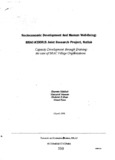| dc.contributor.author | Mahbub, Sharmin | |
| dc.contributor.author | Mannan, Manzurul | |
| dc.contributor.author | Khan, Shahriar R | |
| dc.contributor.author | Rana, Masud | |
| dc.date.accessioned | 2019-11-20T04:56:57Z | |
| dc.date.available | 2019-11-20T04:56:57Z | |
| dc.date.issued | 1996-03 | |
| dc.identifier.citation | Mahbub, S., Mannan, M., Khan, S. R., & Rana, M. (1996, March). Socioeconomic development and human well-being: BRAC-ICDDRB joint research project, Matlab, Capacity development through training: the case of BRAC village organizations. Research Reports (1995): Economic Studies, Vol - X, 350–367. | en_US |
| dc.identifier.uri | http://hdl.handle.net/10361/13022 | |
| dc.description.abstract | This study intends to look at the impact of capacity development of BRAC group members through the activities of RDP (Rural Development Program). Capacity development is an important complementation of the credit program which is the largest and most important activity of RDP. Qualitative data were collected from 3 VOs of South Uddamdi village of MatIab thana where BRAC started working from early 1992. During analysis comparison as made between members who received training and members who did not receive.
Results indicate that members chosen for training are largely selected by VO management committee in assistance with PA and PO. Members receiving training varied from 27% to 39% of VO members. Sometimes the same member received up to 5 training sessions on different topics but did not use more than two. There are large number of NTG members present in these VOs (an average of 27%) who influence the selection process. 83% of the trainers were above the age of 40 years. Also VO management committee members and small group leaders tended to receive most of the training.
Statistically significant effect of skill training on savings/credit performance was noted. Group members who were provided with various inputs for capacity development such as training, credit and employment opportunities, are better-off socially and economically than those who did not get this opportunity.
While looking for regularity of attendance, it was seen that members who received training were more regular in attending weekly meetings than their counterparts.
Problems in utilizing training were lack of opportunities and support from fellow group members as well as staff. Operational problems associated with training includes inducing false hope and inadequate supplies of needed materials.
Member’s perception about training was initially not favorable but later when the benefits started showing their interest increased. The study shows that members perceive the VO as a mechanism through which they may receive services and inputs from BRAC and exert pressure on BRAC staff to provide them with these inputs. This sometimes stress the relationship between the members and staff. However, VO members and BRAC staff pursue for increased interdependency to protect the interest of VOs from external pressures and incursions.
In general, effective skill development had a positive impact on group members lives. Therefore, it may contribute towards sustainability of VOs and their role as an instrument of change. However, during VO formation a clear concept of mobilization should be provided to BRAC staff. The selection procedure of trainees could be made needs based and more participatory. Finally follow up of trainees is necessary to ensure proper application of training skills.
The following recommendations are made:
• During VO formation a clear concept of mobilization should be provided to the field based BRAC staff. They should refrain from creating false hopes and thereby losing the respect and trust of members which is necessary for any sustainable relationship.
• The selection process should be more participatory and be based on the felt needs of it’s members, not oriented to fulfilling program’s target for the year.
• More follow-up is necessary to ensure that the knowledge gained training is retained, shared, disseminated and applied by trainees in income earning activities. | en_US |
| dc.publisher | BRAC Research and Evaluation Division (RED) | en_US |
| dc.subject | Socioeconomic development | en_US |
| dc.subject | Village organizations | en_US |
| dc.subject.lcsh | Social conditions--Bangladesh | |
| dc.subject.lcsh | Economic conditions--Bangladesh | |
| dc.subject.lcsh | BRAC-ICDDR,B Joint Research Project | |
| dc.title | Socioeconomic development and human well-being: BRAC-ICDDRB joint research project, Matlab, Capacity development through training: the case of BRAC village organizations | en_US |
| dc.type | Research report | |

